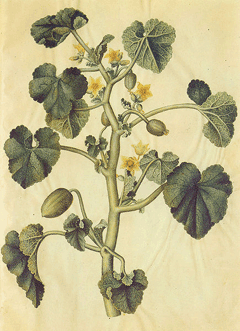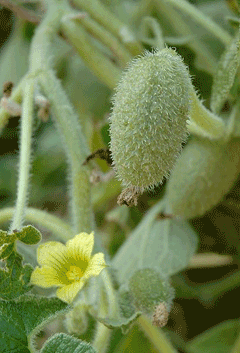 |
|
http://commons.wikimedia.org/wiki/File:Gc3_ecballium_elaterium.jpg |
 |
| http://commons.wikimedia.org/wiki/User:Carstor |
Translate this page:
Summary
Physical Characteristics

 Ecballium is a PERENNIAL growing to 0.3 m (1ft) by 1 m (3ft 3in).
Ecballium is a PERENNIAL growing to 0.3 m (1ft) by 1 m (3ft 3in).
See above for USDA hardiness. It is hardy to UK zone 9 and is frost tender. It is in flower from June to August, and the seeds ripen from August to September. The species is monoecious (individual flowers are either male or female, but both sexes can be found on the same plant) and is pollinated by Insects. The plant is self-fertile.
Suitable for: light (sandy), medium (loamy) and heavy (clay) soils, prefers well-drained soil and can grow in nutritionally poor soil. Suitable pH: mildly acid, neutral and basic (mildly alkaline) soils. It cannot grow in the shade. It prefers dry or moist soil.
UK Hardiness Map
US Hardiness Map
Synonyms
Plant Habitats
Edible Uses
References More on Edible Uses
Medicinal Uses
Plants For A Future can not take any responsibility for any adverse effects from the use of plants. Always seek advice from a professional before using a plant medicinally.
The squirting cucumber has been used as a medicinal plant for over 2,000 years, though it has a very violent effect upon the body and has little use in modern herbalism[238, 268]. The juice of the fruit is antirheumatic, cardiac and purgative[1, 7, 61, 86, 89]. The plant is a very powerful purgative that causes evacuation of water from the bowels[238]. It is used internally in the treatment of oedema associated with kidney complaints, heart problems, rheumatism, paralysis and shingles[86, 238]. Externally, it has been used to treat sinusitis and painful joints[238]. It should be used with great caution and only under the supervision of a qualified practitioner[4, 238]. Excessive doses have caused gastro-enteritis and even death[7]. It should not be used by pregnant women since it can cause an abortion[7]. The fully grown but unripe fruits are harvested during the summer, they are left in containers until the contents are expelled and the juice is then dried for later use[46, 238]. The root contains an analgesic principle[240].
References More on Medicinal Uses
The Bookshop: Edible Plant Books
Our Latest books on Perennial Plants For Food Forests and Permaculture Gardens in paperback or digital formats.

Edible Tropical Plants
Food Forest Plants for Hotter Conditions: 250+ Plants For Tropical Food Forests & Permaculture Gardens.
More

Edible Temperate Plants
Plants for Your Food Forest: 500 Plants for Temperate Food Forests & Permaculture Gardens.
More

More Books
PFAF have eight books available in paperback and digital formats. Browse the shop for more information.
Shop Now
Other Uses
References More on Other Uses
Cultivation details
Prefers a moist well-drained soil in a sunny position[86, 200]. Grows best in a rich soil[1]. Another report says that it succeeds in poor soils[238]. The foliage is fairly frost-tender, though the roots are much hardier and plants can survive quite cold winters in Britain[86]. They are more likely to be killed by excessive winter wet[86]. The squirting cucumber is sometimes cultivated for its use as a medicinal plant[46]. The ripening fruit becomes pumped full of liquid, leading to an increase in pressure. As the seed becomes ripe, this pressure forces the fruit to break away explosively from the plant, ejecting its seed to a considerable distance in the opposite direction. The plant occasionally self-sows in our Cornwall trial ground[K] and can become a weed in warmer climates than Britain[K]. It is subject to statutory control as a weed in Australia[238].
References Carbon Farming Information and Carbon Sequestration Information
Temperature Converter
Type a value in the Celsius field to convert the value to Fahrenheit:
Fahrenheit:
The PFAF Bookshop
Plants For A Future have a number of books available in paperback and digital form. Book titles include Edible Plants, Edible Perennials, Edible Trees,Edible Shrubs, Woodland Gardening, and Temperate Food Forest Plants. Our new book is Food Forest Plants For Hotter Conditions (Tropical and Sub-Tropical).
Shop Now
Plant Propagation
Seed - sow early spring in rich compost in a greenhouse. Place 2 - 3 seeds per pot and thin to the strongest plant. The seed usually germinates in 10 - 21 days at 25°c[175]. Grow the plants on fast and plant them out after the last expected frosts.
Other Names
If available other names are mentioned here
Native Range
TEMPERATE ASIA: Cyprus, Iran (north), Israel, Jordan, Lebanon, Syria, Turkey, Russian Federation-Ciscaucasia (Ciscaucasia), Armenia, Azerbaijan, Georgia EUROPE: Moldova, Ukraine (incl. Krym), Former Yugoslavia, Albania, Bulgaria, Greece (incl. Crete), Italy (incl. Sardinia, Sicily), Romania, Spain (incl. Baleares), France (incl. Corsica), Portugal AFRICA: Algeria (north), Libya (north), Morocco, Tunisia
Weed Potential
Right plant wrong place. We are currently updating this section.
Please note that a plant may be invasive in one area but may not in your area so it’s worth checking.
Conservation Status
IUCN Red List of Threatened Plants Status :

Growth: S = slow M = medium F = fast. Soil: L = light (sandy) M = medium H = heavy (clay). pH: A = acid N = neutral B = basic (alkaline). Shade: F = full shade S = semi-shade N = no shade. Moisture: D = dry M = Moist We = wet Wa = water.
Expert comment
Author
(L.)A.Rich.
Botanical References
46200
Links / References
For a list of references used on this page please go here
Readers comment
| Add a comment |
|
If you have important information about this plant that may help other users please add a comment or link below. Only comments or links that are felt to be directly relevant to a plant will be included. If you think a comment/link or information contained on this page is inaccurate or misleading we would welcome your feedback at [email protected]. If you have questions about a plant please use the Forum on this website as we do not have the resources to answer questions ourselves.
* Please note: the comments by website users are not necessarily those held by PFAF and may give misleading or inaccurate information.
To leave a comment please Register or login here All comments need to be approved so will not appear immediately.
|
|